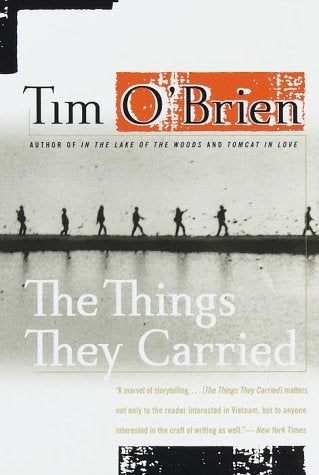If you were captivated by the profound narratives and intricate themes in Tim O’Brien’s “The Things They Carried,” you may find yourself yearning for more literature that captures the essence of war, memory, and the human condition. This list delves into a selection of compelling reads that conjure similar emotional landscapes, offering insightful explorations of trauma, love, sacrifice, and resilience. Below are must-reads that echo the fundamental elements of O’Brien’s narrative.
1. A Farewell to Arms by Ernest Hemingway
Hemingway’s semi-autobiographical novel is set against the backdrop of World War I, chronicling the tumultuous romance between an American ambulance driver and a British nurse. The novel’s poignant prose illustrates the brutality of war, intertwined with themes of love and loss. The sparse yet powerful language mirrors O’Brien’s style, capturing the raw emotions experienced by those caught in the chaos of conflict. Readers will appreciate Hemingway’s unflinching examination of the human psyche amidst the horrors of battle.
2. The Yellow Birds by Kevin Powers
This National Book Awards finalist paints a haunting portrait of young soldiers navigating the complexities of the Iraq War. Powers, a veteran himself, uses poignant imagery and lyrical prose to evoke the inescapable burdens carried by each soldier. The narrative oscillates between the battlefield and the internal struggles faced by the characters, mirroring O’Brien’s exploration of memory and trauma. Readers will find themselves enveloped in a profound understanding of the psychological weight of warfare.
3. All Quiet on the Western Front by Erich Maria Remarque
This seminal work remains an indispensable classic, documenting the harrowing experiences of a group of German soldiers during World War I. Remarque’s narrative powerfully depicts the disillusionment and emotional desolation that accompany intense combat. The visceral language and vivid descriptions of the battlefield resonate deeply with the themes in “The Things They Carried.” Readers will encounter horrific realities and a poignant longing for peace that will leave a lasting impact.
4. Redeployment by Phil Klay
Klay’s Pulitzer Prize-winning collection of short stories offers an authentic perspective on the contemporary experiences of soldiers returning from Iraq and Afghanistan. Each tale delves into the different facets of military life, showcasing the struggles of reintegration into civilian society. Klay’s masterful storytelling parallels O’Brien’s style, capturing the complexities of duty, morality, and the haunting memories that persist long after combat ends.
5. The Things They Carried (Graphic Novel Adaptation)
The graphic novel adaptation of O’Brien’s work presents a fresh and visually compelling interpretation of his original narrative. Illustrated with evocative art, this version brings to life the emotional heft of the soldiers’ experiences in a unique format. The combination of imagery and text magnifies the raw, visceral impact of the stories. This adaptation allows readers to engage with the material in a new way, heightening the emotional resonance of O’Brien’s seminal work.
6. War and Peace by Leo Tolstoy
A monumental literary achievement, Tolstoy’s epic novel explores the profound effects of the Napoleonic Wars on Russian society and the individuals within it. While far longer and more intricate than O’Brien’s narrative, “War and Peace” shares thematic concerns about the intersection of personal lives and global conflict. Rich in philosophy and historical insight, this book offers a broader lens through which to understand the enduring nature of war and its impact on humanity.
7. The Shell Collector by Anthony Doerr
This collection of short stories deftly examines the human condition through the lens of loss, love, and the search for meaning amid chaos. Doerr’s ability to conjure vivid imagery allows readers to experience the weight of memory, evoking a sense of awe similar to that felt in O’Brien’s work. The thematic depth and intimacy in Doerr’s writing will resonate with those who appreciated the emotional intricacies of “The Things They Carried.”
8. The Book Thief by Markus Zusak
Set in Nazi Germany, Zusak’s novel follows the story of a young girl who finds solace in books during tumultuous times. The narrative, told from the perspective of Death, weaves together themes of mortality, hope, and human connection that echo O’Brien’s exploration of life and death in war. The poignant storytelling invites reflection on the impact of literature as a means of coping with the harsh realities of lived experience.
9. The Kite Runner by Khaled Hosseini
This compelling story spans decades and examines the deep-seated effects of personal betrayal and redemption against the backdrop of a war-torn Afghanistan. Themes of friendship, guilt, and the burdens of memory resonate throughout the narrative, providing a lens through which readers can explore the intricacies of human relationships amid conflict. Hosseini’s powerful storytelling serves to remind readers of the enduring scars that war can leave on the heart.
10. Matterhorn by Karl Marlantes
A vivid and unflinching portrayal of the Vietnam War, “Matterhorn” chronicles the experiences of a platoon of Marines in combat and their struggles with friendship, bravery, and despair. Marlantes’ detailed prose immerses readers in the visceral realities of warfare, echoing the weight of memory carried by O’Brien’s characters. The moral complexities of combat are explored with depth, prompting profound reflections on the nature of honor and sacrifice.
Whether you are drawn to the harrowing truths of war or the intimate portraits of characters navigating their own emotional landscapes, these titles provide a multifaceted exploration of themes akin to those found in “The Things They Carried.” Each work invites readers to ponder the weight of their narratives as they reflect on the universal experiences of humanity in times of conflict and adversity.

